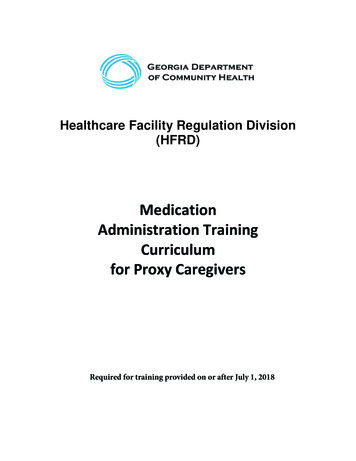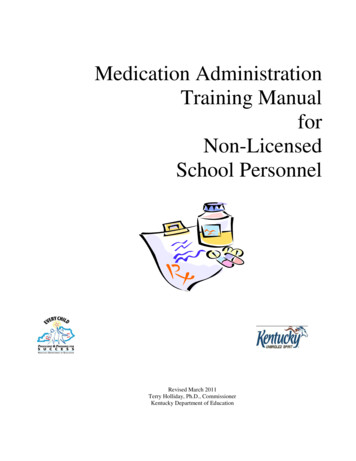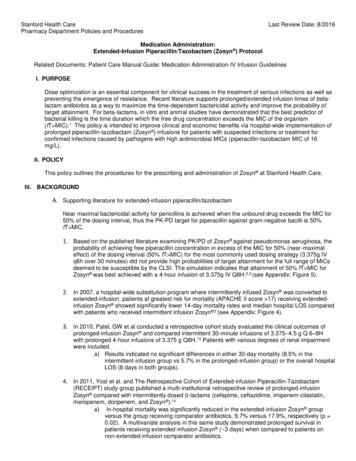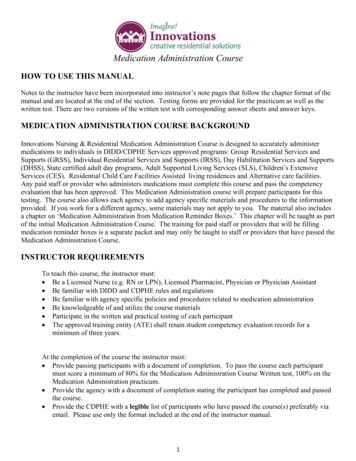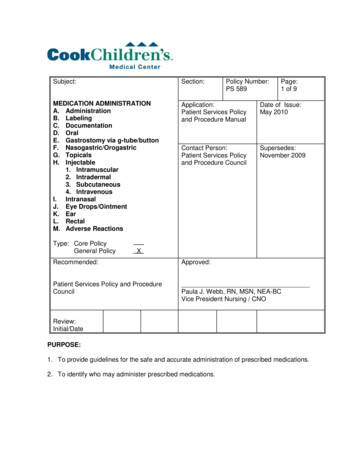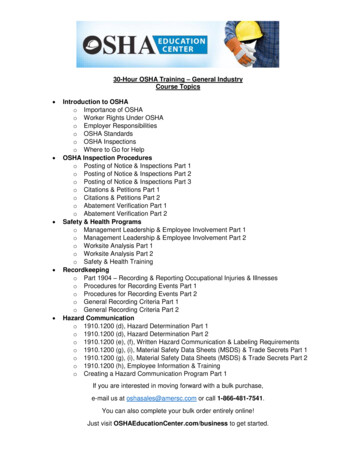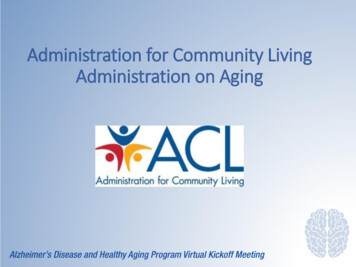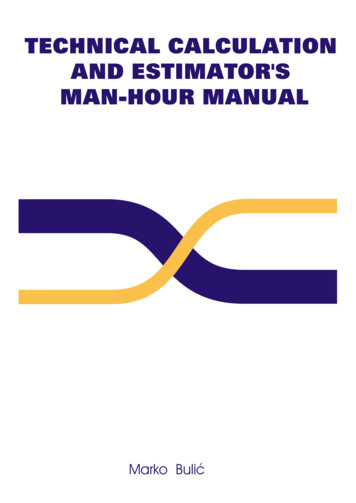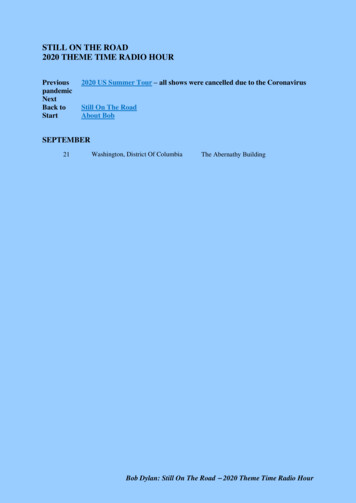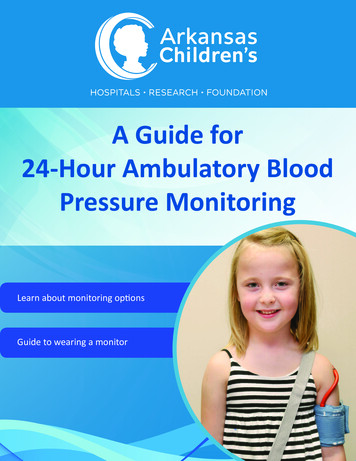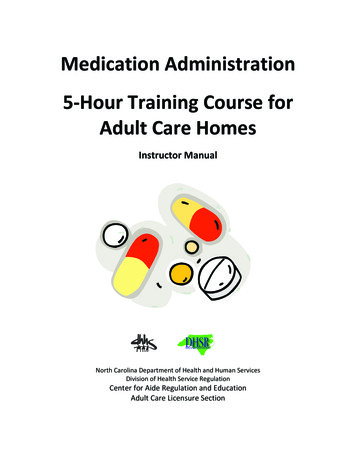
Transcription
Medication Administration5-Hour Training Course forAdult Care HomesInstructor ManualNorth Carolina Department of Health and Human ServicesDivision of Health Service RegulationCenter for Aide Regulation and EducationAdult Care Licensure Section
The Medication Administration: 5-hour Training Course for Adult Care Homes was developedas a joint effort by the Center for Nurse Aide Education and Regulation and Adult CareLicensure Section of the Division of Health Service Regulation, N.C. Department of Health andHuman Services.The curriculum for the 5-hour training course was adapted from the MedicationAdministration: A Medication Aide Training Course developed by the North CarolinaDepartment of Health and Human Services and the North Carolina Board of Nursing.CURRICULUM DEVELOPMENTCenter of Aide Education and Regulation, Division of Health Service RegulationAdult Care Licensure Section, Division of Health Service RegulationNorth Carolina Department of Health and Human ServicesSeptember 2013Medication Administration5-Hour Training Course for Adult Care Homesi
Medication Administration:5-Hour Training Course for Adult Care HomesInstructor ManualTable of ContentsTABLE OF CONTENTSSectionTitleTitle PageTable of ContentsMedication Aide in Adult Care HomesIntroductionPre-requisite for StudentsMedication Aide Course Training Requirements andDirections for UseStudent ManualCourse ObjectivesCourse SchedulePrerequisite Skills Review and ValidationPageiiivviviviiviiiixxi1Section 1Basic Medication Administration Information/TerminologyTeaching GuideAbbreviationsCommon Routes of Medication AdministrationCommon Dosages Forms of MedicationsIntro to Equipment and Supplies for Medication AdministrationSix Rights of Medication AdministrationMedication ErrorsMedication Administration and Resident’s RightsMedication AllergyRecognizing Side EffectsMedication Resources or ion 2Medication OrdersTeaching GuideMedication OrdersDefinition of an OrderComponents of an OrderTelephone and Verbal OrdersForms commonly used to Document Medication OrdersFL-2Physician’s Order FormsMedication Administration Records (MARs)Medication Labels2-12-22-32-32-32-42-52-52-52-52-6ii
Medication Administration:5-Hour Training Course for Adult Care HomesInstructor ManualTable of ContentsSectionTitlePageSection 3Medication AdministrationTeaching GuideInfection Control/Standard PrecautionsHand HygieneGlovesInjection SafetyMedication Administration SuppliesRight Resident: Identifying ResidentsRight Medication/Right Dose/Right Route/Right Time:Medication Administration Record and Medication LabelRight Documentation: Medication Administration RecordUnique Situations to do Prior to Administrationof MedicationsVital SignsCrushing Medications3-13-23-33-43-53-63-63-7Section 4Section 53-73-83-93-93-10Administering Medications: Medication RoutesGeneral Medication AdministrationOral Medication AdministrationSublingual Medication AdministrationOral InhalantEye Medication AdministrationEar Medication AdministrationNasal Medication AdministrationTransdermal Medication AdministrationTopical Medication AdministrationInjection Medication Administration Ordering, Storage and Disposal of MedicationsTeaching GuideOrdering MedicationMedication StorageControlled SubstancesDisposal of Medications4-24-34-34-44-4Medication Administration ChecklistsInstructions for Completing the Medication AdministrationChecklistsHand Hygiene (Skills #1-3)General Medication Administration (Skills #4A & #4B)5-15-35-6iii
Medication Administration:5-Hour Training Course for Adult Care HomesInstructor ManualTable of ContentsSectionTitleSection 5Medication Administration (cont’d)Oral Medication Administration (Skill #5)Sublingual Medication Administration (Skill #6))Oral Inhalant (Skill #7)Eye Medication Administration (Skill #8)Ear Medication Administration (Skill #9)Nasal Medication Administration (Skill #10)Transdermal Medication Administration (Skill #11)Topical Medication Administration (Skill #12)Injections Medication Administration (Skill #13 & #14)5-85-95-105-115-135-145-155-165-17Handouts#1A Abbreviations#1B Common Routes of Medication Administration#1C Common Dosage Forms of Medications#1D Six Rights of Medication Administration#1E Medication Errors#1F Resident’s Refusal to Take Medications#2A Medication Orders#2AA Medication Order (Answers)#2B FL-2 (Blank)#2C MAR (Blank)#2D FL-2 (Transcription Activity)#2E MAR (Transcription Activity Answers)#2F Medication Labels#3A Injection Safety: Diabetes & Viral Hepatitis#3B Review of Measuring Devices#3C Always and Never#3D Measuring Tips#3E Technique and Use of Oral 36-146-156-166-176-18ActivitiesActivity #1 Hand HygieneActivity #2 Instructions for Glove SizingActivity #3 Gloves, Gloves, GlovesActivity #4A, B, C Medication Administration Record7-27-37-47-5Section 6Section v
Medication Aide in Adult Care Homes1. A Medication Aide in adult care homes is an individual who has successfully completed therequired Medication Aide course(s) approved by the N.C. Department of Health and HumanServices, passed the state written medication exam for unlicensed staff in adult care homesand has competency skills validation at the employing facility.Any individual employed as a Medication Aide prior to 10/01/2013 must be able to verifyemployment as a medication aide within the previous 24 months and completedcompetency skills validation and passed the state written exam for Medication Aides in adultcare homes.All Medication Aides in adult care homes must have competency validation at the employingfacility and maintain the 6 hours of continuing education requirements annually.2. The laws and regulations governing Medication Aides in adult care homes in N.C. include:GS § 131D-4.5, GS § 131D-4.5A, GS § 131D-4.5B, 10A NCAC 13F/G .0403; 10A NCAC 13F/G.0503; 10A NCAC 13F/G .0505; 10A NCAC 13F/G .0506, 10A NCAC 13F/G .0903 and 10ANCAC 13F/G .1000.3. The routes of medication administration in this course include the following: oral, eye, ear,nasal, inhalant, transdermal and topical. General information and skills check off forsubcutaneous injections, is included in the curriculum but is only required if the task will beperformed by Medication Aide.4. Allegations of fraud against a facility or resident, resident abuse or neglect, misappropriationof property belonging to a resident or facility, or diversion of medication belonging to aresident or facility by the Medication Aide must be reported to the N.C. Health CarePersonnel Registry. Substantiated findings by the Heath Care Personnel Registry are postedon the Health Care Personnel Registry.5. It is the responsibility of the Medication Aide to notify the Adult Care Licensure Section ofname and address changes.6. Information on registration for the state written exam for unlicensed staff in adult carehomes may be obtained at www.ncdhhs.gov/dhsr/acls/medtech.html or via email toAdultCare.ctu@dhhs.nc.gov. Results or verification may be obtained via website atN.C. Adult Care Medication Testing.Medication Administration5-Hour Training Course for Adult Care Homesv
INTRODUCTIONIn 2011, the North Carolina Legislature mandated training in addition to competency evaluation requirementsfor adult care home medication aides. As a response to the legislation, the North Carolina Department ofHealth and Human Services, Division of Health Service Regulation, has developed the required 5-hour and 10hour training courses that include instruction in the key principles of medication administration and infectionprevention.The department developed a 5-hour, 10-hour and 15-hour standardized training course to assist qualifiedinstructors to train unlicensed staff who will administer medications to residents in Adult Care Homes. Eachtraining course includes an instructor manual, materials for a student manual and a certificate templaterequired for participants who successfully complete the course(s).Course Description The 5-hour training course was built around the current skills checklist required for medication staff inadult care homes. The majority of the 5-hour course schedule centers around time spent for instructionand validation of skills required for medication administration. Individuals are expected to pass the clinicalskills tasks with 100% competency demonstrated. The design of the course was for a small class ofemployees or 1:1 training for a specific facility. The 10-hour training course builds upon content in the initial 5-hour training course and developed as arefresher for the employee. The 10-hour training course does include random competency validation ofskills required for medication administration. A prerequisite for the 10-hour training course is successfulcompletion of the 5-hour training course. The design of the course was for a larger class than the 5-hourtraining course but still limited in size to allow for interactive activities and practice of safe medicationadministration skills. The 15-hour training course was developed as another option to meet the requirements of the 5-hour and10-hour training mandated by legislation. The course provides 10 hours of classroom instruction and 5hours of clinical skills validation. Successful completion of this course meets the requirements for the 5hour and 10-hour training courses. Individuals are expected to pass the clinical skills tasks with 100%competency demonstrated. The design of the course was for a larger class than the 5-hour training coursebut limited to allow for lots of practice and integration of safe medication administration skills.The 5-hour, 10-hour and 15-hour training courses were adapted from the “Medication Administration: AMedication Aide Training Course” curriculum developed in 2006 by the North Carolina Department of Healthand Human Services and the North Carolina Board of Nursing.The 5-hour, 10-hour, and 15-hour competency-based curriculums provide unlicensed staff with basicknowledge and skills needed to ensure that medication administration is performed in a safe and effectivemanner. Successful completion of the 5-hour plus 10-hour training courses or the 15-hour training courseswill prepare individuals to take the state written medication exam for adult care home staff.Pre-requisite for Students Must be able to understand, follow and communicate written English instructions. Successfully complete the Pre-requisite Skills Review and Validation of the course.Medication Administration5-Hour Training Course for Adult Care Homesvi
Medication Aide Course Training Requirementsand Directions for Instructor ManualMinimum RequirementsThis course has been prepared for instructors qualified to teach state-mandated content in medicationadministration to unlicensed staff employed in adult care homes.Course ContentEach course has been divided into sections. Each of the sections includes core content considered to befoundations of medication administration knowledge that medication aides must know to safely and correctlyadminister medications in adult care homes. Curriculum pages are provided in a portrait layout withinstructional content.Medication Administration: 5-hour course for adult care homes: Prerequisite: Prerequisite Skills Review and Validation Section 1: Basic Medication Administration Information/Terminology Section 2: Medication Orders Section 3: Administration of Medication Theory (Including skills validation) Section 4: Ordering, Storage and Disposal of Medications Section 5: Medication Administration Skills ChecklistsClassroom InstructionTeaching Guide is at the beginning of each section and serves as a resource to prepare the instructor to teachthe section. It lists the objectives to cover, handouts and activity sheets to duplicate, and supplies.Blocks of content are included within the confines of borders or boxes and specify what is to be taught to thestudents during classroom instruction.Teaching tips are included that complements the content and provides the instructor with ideas andsuggestions to clarify information, involve students in discussion, and engage students with varied learningstrategies. It is an expectation that the instructor will consistently incorporate teaching tips during theteaching of the content. Each teaching tip is preceded by a symbol, followed by a brief title of the teachingtip. Each instructor will incorporate the material with her/his presentation style but the content is to becovered throughout the course presentation.Suggested activities promote student-centered learning and actively engage the students in the learningprocess. Activities provide the students with opportunities to practice what they have learned in class. The useof activities energizes the classroom, breaks-up the monotony of passive receipt of information through lectureand provides a deeper understanding of content by the students. Some activities involve the duplication ofactivity sheets.Skills RequirementsThe skills portion of the 5-hour and 15-hour training courses consist of skills critical to correct medicationadministration practice.Medication Administration5-Hour Training Course for Adult Care Homesvii
First, demonstration of skills must be performed by a qualified instructor. As the instructor demonstrateseach skill, the students should have an unobstructed view of the process and have skill check sheets availableto refer to and follow along as the instructor proceeds through the steps of the skill.Guided student practice is a vital component of skill acquisition. Guided student practice is best done rightafter skills demonstration. During this type of student practice, the instructor observes the practice sessionsand provides descriptive feedback. The instructor must be astute and correct errors during guided practice toprevent the repetition of errors. If a student continually practices a skill incorrectly, there is a great risk thatthe student will continue to perform the skill incorrectly during the skill check-off and while providing care toresidents.Skill check-offs are performed after demonstration and student practice have taken place. Skills check-offsfor infection prevention and administration of oral, ophthalmic, otic, nasal, inhalant, transdermal and topicalmedications are considered basic medication administration skills to which the unlicensed person mustdemonstrate competency validation. Optional skills check-off for subcutaneous injections is included. Aunlicensed person who will perform the “optional” task must be competency validated by a Registered Nurse.DocumentationThe adult care home must maintain documentation of successful completion of the medication administrationtraining courses for each unlicensed staff that performs medication aide duties and successfully completestraining. Documentation maintained in the employee’s file includes the certificate of successful completion ofrequired training courses and skills check offs for basic medication administration skills identified above. For 5hour and 15-hour training courses performed specifically for staff of an adult care home, the skills check-offscompleted during the training course may be used to meet the documentation of competency validation.Requirements for InstructorsInstructors of the Medication Administration: 5-hour and 10/15-hour Aide Training Courses for Adult CareHomes should be a Registered Nurse or licensed pharmacist in good standing with their North Carolinaoccupational boards and knowledgeable in teaching current standards of practice of medication administrationand infection prevention and regulations related to adult care homes. Skills for the basic medicationadministration skills listed above must be validated by the Registered Nurse or licensed pharmacist. Any otherskills for routes of administration, including the “optional” administration routes listed above must bevalidated by a Registered Nurse.Student ManualA student manual may be created using the handout and activities. The student may benefit from review ofthe materials prior to the training. The student should receive a copy of the skills checklist. The information willhelp the student understand and perform the basic competencies required to safely administer medications bythe following routes: oral, sublingual (under the tongue), otic (ear), ophthalmic (eye), nasal (nose), topical (onthe skin), and inhalant (breathed into the lungs).Medication Administration5-Hour Training Course for Adult Care Homesviii
Course ObjectivesPrerequisite Skills Review and ValidationAt the completion of this section, the student should:1.2.3.4.5.Demonstrate correct technique in obtaining and recording a blood pressure.Demonstrate correct technique in obtaining and recording a radial and apical pulse.Demonstrate correct technique in obtaining and recording a respiratory rate.Demonstrate correct technique in obtaining a temperature.Demonstrate correct technique with assisted glucose monitoringSection 1: Basic Medication Administration Information/TerminologyAt the completion of this section, the student should:1.2.3.4.5.Match common medical abbreviations with their meaning.List and describe common dosage forms of medications.List and describe common routes of medication administration.List the six rights of medication administration.Describe what constitutes a medication error and actions to take when a medicationerror is made or detected.6. Describe resident’s rights regarding medications – refusal, privacy, respect, andchemical restraint.7. Define medication “allergy” and describe responsibility in relation to identified allergiesand suspected side effects.8. Demonstrate the use of medication resources or references.Section 2 – Medication OrdersAt the completion of this section, the student should:1. List/recognize the components of a complete medication order.2. Transcribe orders onto the Medication Administration Record (MAR) correctly – useproper abbreviations, calculate stop dates correctly, transcribe PRN ordersappropriately, copy orders completely and legibly and/or check computer sheets againstorders and apply to the MAR, and discontinue orders.3. Describe the responsibility of the Medication Aide in relation to admission orders,readmission orders, and FL-2 forms.4. Identify required information on the medication label.Medication Administration5-Hour Training Course for Adult Care Homesix
Section 3 – Medication AdministrationAt the completion of this section, the student should:1. Demonstrate correct infection control concepts during medication administration.2. Compare and contrast the documentation of routine medication administration andPRN medication administration.3. List commonly used abbreviations and terminology related to medicationadministration.4. Demonstrate proficiency in reading a medication label.5. Use the Six Rights to administer oral, topical, eye, ear, inhalant, vaginal and rectalmedications – right resident, right medication, right dose, right route, right time, andright documentation.6. Demonstrate the use of the Medication Administration Record (MAR).7. Identify proper action to take when special circumstances occur in relation tomedication administration.Section 4 – Ordering, Storage and Disposal of MedicationsAt the completion of this section, the student should:1. Describe procedures for reordering medications and ensuring medications ordered areavailable for administration.2. Describe correct storage and securing of medications.3. Maintain an accurate inventory of controlled substances.4. Identify the procedures for disposal of medications.Medication Administration5-Hour Training Course for Adult Care Homesx
Course ScheduleSectionPrerequisite Skills Review andValidationSection 1:Basic Medication AdministrationInformation/Terminolo
and Human Services and the North Carolina Board of Nursing. The 5-hour, 10-hour, and 15-hour competency-based curriculums provide unlicensed staff with basic knowledge and skills needed to ensure that medication ad
